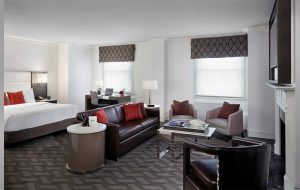Many acquaintances not familiar with the hospitality industry make the comment when I tell them what service GS Associates, Inc. provides; “I never thought about how all of this gets made and into the rooms.” The recent renovation of the Boston Park Plaza’s 1,100 rooms is an example in logistical planning and risk mitigation from factory to placement in the intended location in the hotel. And all of this is AFTER the design and dimensioning of rooms and furnishings before the products are custom manufactured. Our clients spend millions on furniture, fixtures, artwork and electronics. After production it is loaded into trucks or shipping containers. Client’s materials are protected by carrier’s insurance covering the value of the goods up to $100,000 per container or truck trailer. If the cargo happens to be more than this value then insurance supplements are available. Logistical planning needs to include determining which goods can be delivered directly to the hotel site which need to be delivered to a warehouse for staging and redelivery. It is great to avoid warehouse handling and storage costs but not at the cost of damage, loss, unconditioned storage or without a lock of organization. All deliveries should be inspected for visual damage to the packaging/cartoning and properly signed for to ensure the client has recourse to the carrier for freight damage. More often than not, hotel properties, new or renovating, do not have the staging areas to take the items directly into the building. Proper care, condition, security, and organization is a way to protect the investment of the furnishings and should be considered in all situations. To further complicate matters, guestrooms in a hotel are not always the same footprint meaning that they receive different pieces of furniture. Just ask GSA’s senior project director Toni Collins Ross and project manager Trisha Wheeler who were tasked with the buyout and coordination of installing the Boston Park Plaza’s 164 different room type configurations. Room types included different size nightstands, desks, beds and bathroom vanity sizes. In a phased renovation Ross and Wheeler’s “load schedule” to the warehouse contractor to load the trucks with the furnishings required floor by floor. Each item has a unique specification code coordinating with the label furniture layouts to allow the furniture installation team to place the furniture in the right room, in the right place. All of this planning (also prior to production and construction) begs the questions of dimensioning and planning; do the items fit in the elevators, are the elevators ready, will the construction trades be out of the area for access to loading docks and elevators, is there blocking in the walls for fixing mirrors, artwork, headboards securely and safely. Reviews were necessary to ensure that electrical outlets do not get covered, or that items can simply fit through doors.
Assuming storage is opted for the warehousing contractor will receive, inspect (without opening the cartons unless there is visual damage to the carton) and organize properly in the warehouse for the eventual redelivery to the site. Once received from the carrier, the insurance of the warehouse contractor covers the cost of the materials in storage and during redelivery transit. It is also important to confirm that the materials being stored are covered for full value, as there are some limitations on warehouse coverage. A rider to cover full value is not typically a big premium. The winter storms in New England in 2015 caused a warehouse roof to collapse and damaged new FF&E.
Many clients ask to have the warehouse open and inspect all the materials. This is not recommended based on the cost to perform the inspection and the fact that it compromises the packaging that would secure the materials for redelivery to the hotel. All receiving parties whether at the warehouse, site or other locations are provided with comprehensive receiving instructions to ensure that claims for concealed damage can be processed.
When the items are delivered to the hotel site, it is all about access and loading into the rooms. Pre-planning needs to be done to determine the size and number of the trucks that the site can take. Is there traffic control that needs to be considered? Delivery and loading occurring in the second shift after the construction trades have left for the day can allow for better efficiency and can allow for dedicated elevators. One of the typical requests is to add more manpower to projects that are behind schedule. However, dock space, staging space or elevator access are the usual bottlenecks and adding labor does not necessarily speed up installation. Also, the skill works of carpentry and mounting in the rooms can be compromised by adding workers who do not have the proper skills or have not gone through the learning curve. A quality furniture installation is a combination of project team cooperation, having the areas completed, the installer’s skill, experience and hiring conscientious workers. There is always an element of adapting to the project conditions that occur beyond what is planned.
With the circuitous route the furnishings take from many locations in the world, with freight and handling there are inevitably issues of bumps and damages. Preplanning on having a readied furniture repair craftsman, touch up kits from the vendors, or ready access to attic stock items, maximizes the number of rooms in operational condition. Good communication and early intervention allows for replacement orders to minimize out of order rooms. The interior furnishings are not the most important issue on the agenda when owners are building or renovating a hotel, but is important not to take it lightly or to take short cuts in a process that is more complicated than it intuitively seems to be. The owners of the Boston Park Plaza Hotel are an experienced and sophisticated hotel development company and the anticipation and expectations were well aligned for a successful implementation of a very difficult renovation.
Gus Sarff, ISHC, is president and owner of GS Associates, Inc., a procurement consulting firm providing FF&E and OS&E services locally, nationally and globally for luxury, convention, resort, limited service hotels, fractional ownership properties, restaurants, and function facilities.
For over 25 years, GS Associates, Inc. has continued to develop procurement technology and creative sourcing to maintain its leadership in the industry. GSA’s services are transparent, expert, and will make a positive impact on any project.











